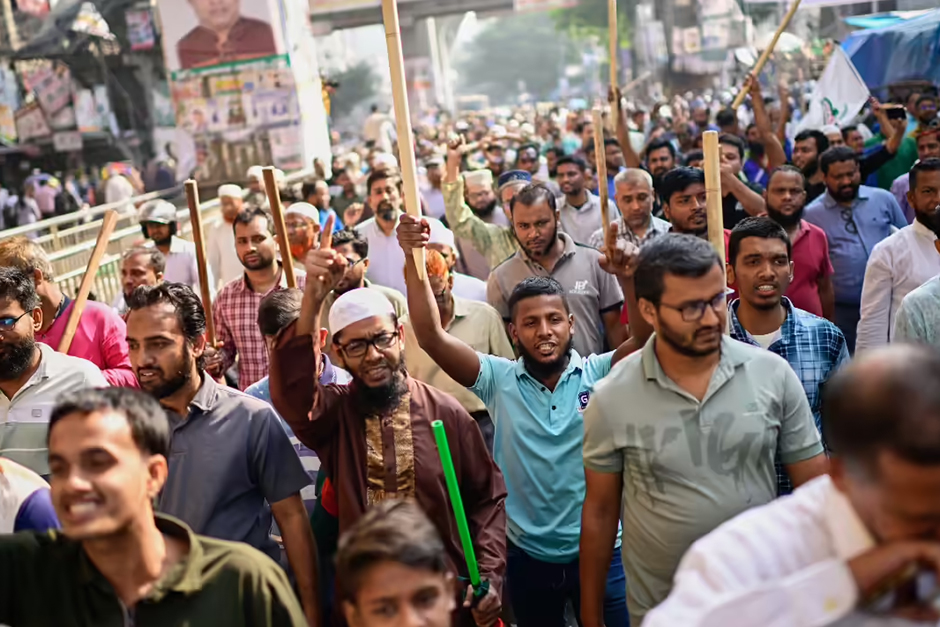Bangladesh finds itself teetering on a precipice, with political tensions reaching a fever pitch ahead of a crucial court verdict concerning Prime Minister Sheikh Hasina. The capital, Dhaka, has been rocked by multiple crude bomb explosions, escalating fears of widespread unrest. In a stern warning that underscores the gravity of the situation, police have reportedly been instructed to shoot violent protesters on sight, a directive that has sent ripples of concern across the region, including in neighbouring India.
Escalating Tensions and Security Posture
The explosions, which occurred in various parts of Dhaka, including busy commercial areas and near political party offices, have injected a fresh wave of anxiety into an already volatile atmosphere. While no immediate casualties were reported from all incidents, they serve as a chilling reminder of Bangladesh’s history of political violence, often preceding or following significant political events. These acts of sabotage are widely seen as an attempt to destabilize the country ahead of the much-anticipated court decision, the specifics of which, though publicly known, are charged with the potential to significantly alter the nation’s political landscape.
Security forces across Bangladesh have been placed on high alert. Thousands of additional police and paramilitary personnel have been deployed in Dhaka and other major cities, establishing checkpoints and intensifying patrols. The “shoot on sight” order for violent protesters highlights the administration’s resolve to maintain law and order, but it also raises serious human rights concerns and could potentially lead to further escalation. Such directives are typically reserved for extreme situations, reflecting the government’s apprehension about the scale of potential demonstrations and clashes.
Political Undercurrents and Past Precedents
The impending verdict against Prime Minister Sheikh Hasina, a towering figure in Bangladeshi politics and leader of the Awami League, is a flashpoint in the deeply entrenched rivalry with the opposition Bangladesh Nationalist Party (BNP). Both parties have a history of mobilizing large-scale protests, often leading to confrontations with security forces and each other. The court case itself is politically charged, with the opposition often alleging selective prosecution aimed at marginalizing dissent and consolidating power.
Observers note that Bangladesh has a complex history of political transitions marked by periods of instability, military rule, and violent street protests. Major electoral cycles or judicial pronouncements involving top political figures have historically triggered widespread disruption. The current climate is reminiscent of past periods of heightened political volatility, where calls for strikes (hartals) and demonstrations frequently paralyzed daily life and often resulted in casualties. The fear is that the verdict, irrespective of its outcome, could be a catalyst for further division and confrontation.
“The current volatility underscores the fragile nature of democratic institutions when political rivalries run deep. All stakeholders must prioritize dialogue over confrontation to prevent further bloodshed and uphold the rule of law,” remarked Dr. Rohan Sharma, a South Asia analyst based in Delhi, reflecting a common regional sentiment.
Regional Implications and India’s Watch
For India, a stable and peaceful Bangladesh is not merely a matter of good neighbourly relations but a crucial component of its regional strategic interests and security concerns. Bangladesh shares a long and often porous border with several Indian states, and any significant political upheaval there can have direct implications for India, including potential refugee flows, increased cross-border criminal activities, and challenges to regional trade and connectivity initiatives under India’s ‘Act East’ policy.
New Delhi is undoubtedly monitoring the situation in Dhaka with keen interest, advocating for calm and adherence to democratic processes. India has traditionally maintained a policy of non-interference in the internal affairs of its neighbours, but the prospect of prolonged instability in Bangladesh is a significant concern. A strong, stable Bangladesh is vital for counter-terrorism efforts, economic cooperation, and maintaining a balance of power in South Asia. International bodies and human rights organizations are also closely watching the situation, urging all parties to exercise restraint and respect fundamental rights.
As Bangladesh braces for the verdict, the coming days will be critical. The nation stands at a crossroads, with the potential for either a path towards calm resolution or a descent into further political turmoil. The world, particularly its neighbours, watches with bated breath, hoping for a peaceful outcome that upholds democratic principles and ensures the safety and well-being of its people.




